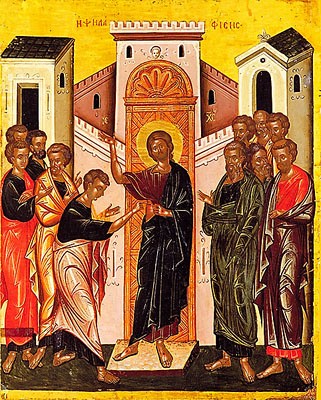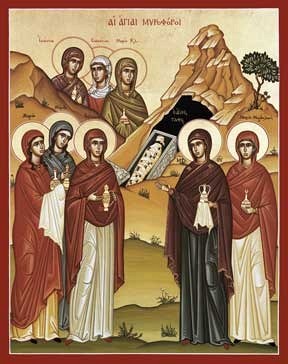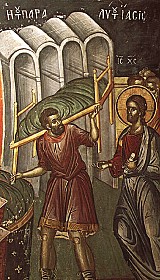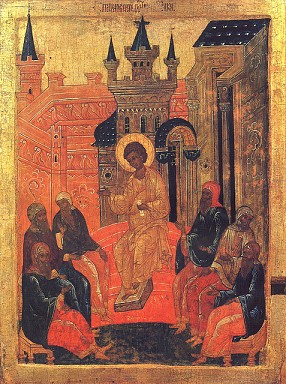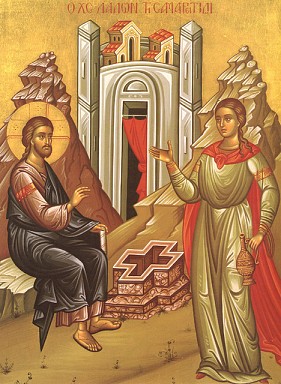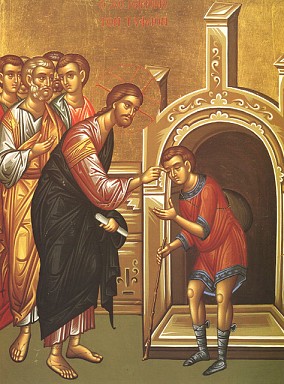In the Church services the stress is on the Apostle Thomas’ vision of Christ and the significance of the day comes to us in the words of the gospel:
Then he said to Thomas, “Put your finger here, and see my hands; and put out your hand, and place it in my side; do not be faithless, but believing.” Thomas answered him, “My Lord and my God!” Jesus said to him, “Have you believed because you have seen me? Blessed are those who have not seen and yet believe” (John 20:27-29).
We have not seen Christ with our physical eyes nor touched his risen body with our physical hands, yet in the Holy Spirit we have seen and touched and tasted the Word of Life (1 Jn 1:1-4), and so we believe.
At each of the daily services until Ascension Day we sing the Easter Troparion. At each of the Sunday services beginning with Antipascha, we sing the Easter canon and hymns, and repeat the celebration of the “first day of the week” on which Christ rose from the dead.
At all of the liturgies the epistle readings are taken from the Book of Acts telling us of the first Christians who lived in communion with the Risen Lord. All of the gospel readings are taken from the Gospel of St John, considered by many to be a gospel written particularly for those who are newly-baptized into the new life of the Kingdom of God through death and new birth in Christ, in the name of the Holy Trinity.
The reason for this opinion is that all of the “signs”—as the miracles in St John’s Gospel are called—deal with sacramental themes involving water, wine and bread. Thus, each of the Sundays after Thomas Sunday with the exception of the third, is dedicated to the memory of one of these “signs.”
Read more about Thomas Sunday...When Thou didst descend to death, O Life Immortal,
The angel came to the myrrhbearing women at the tomb and said:
The Fourth Sunday is dedicated to Christ’s healing of the paralytic (Jn 5). The man is healed by Christ while waiting to be put down into the pool of water. Through baptism in the church we, too, are healed and saved by Christ for eternal life. Thus, in the church, we are told, together with the paralytic, to "sin no more that nothing worse befall you” (Jn 5:14).
While continuing to rejoice in and proclaim the Lord's resurrection and victory over death, on this Sunday the Church pivots from celebration to concentration, placing us firmly back on the path of pastoral, curative therapy within the life of grace in the Church, and setting before us one of the deeper meanings of Pascha: In the Light of the Resurrection, we can come to see ourselves as we really are, paralyzed by a matrix of weaknesses and failings, yet called by Christ to begin living the Resurrected Life here and now. Like the paralytic of old, we can reach out to Christ as the One who can heal us.
"Today is a feast day for all of us paralytics. Today, brothers and sisters, we to a certain degree are meeting our name-day, our feast day. Who among us can boast that he is strong, courageous, bearing all the misfortunes of this age, fulfilling all of Christ’s commandments? ... Paralytic bothers and sisters! Let us rejoice that we at least understand ourselves as we are! The Lord came into the world to save paralytic sinners, and us among them... "
Read more about the Sunday of the Paralytic...
The Midfeast of Pentecost
In the middle of this fourth week, the middle day between Easter and Pentecost is solemnly celebrated. It is called the feast of Mid-Pentecost, at which Christ, “in the middle of the feast” teaches men of his saving mission and offers to all “the waters of immortality” (Jn 7:14). Again we are reminded of the Master’s presence and his saving promise: “If anyone is thirsty let him come to me and drink” (Jn 7:37). We think also once again of our death and resurrection with Christ in our baptism, and our reception of the Holy Spirit from him in our chrismation. We “look back to one, and anticipate the other” as one of the hymns of the feast puts it. We know that we belong to that kingdom of the Risen Christ where “the Spirit and the Bride say, ‘Come!’ And let him who is thirsty come, let him who desires take the water of life without price” (Rev 22:17. Is 55:1).
Troparion
Sunday of the Blind Man — The sixth Sunday commemorates the healing of the man blind from birth (Jn 9). We are identified with that man who came to see and to believe in Jesus as the Son of God. The Lord has anointed our eyes with his own divine hands and washed them with the waters of our baptism (John 9:6-ll).
Jesus used clay of spittle and told the man to wash in the waters of Siloam. He did so because it was the Sabbath day on which spitting, clay-making and washing were strictly forbidden. By breaking these ritual laws of the Jews, Jesus showed that he is indeed the Lord of the Sabbath, and, as such, that he is equal to God the Father Who alone, according to Jewish tradition, works on the Sabbath day in running his world.
There is scandal over the healing of the blind man on the Sabbath day. He is separated from the synagogue because of his faith in Christ. The entire Church follows this man in his fate, knowing that it is those who do not see Jesus as the Lord who are really blind and still in their sins (Jn 9:41). The others have the light of life and can see and know the Son of God, for “you have seen him, and it is he who speaks to you” (Jn 9:37).
blind from birth in my spiritual eyes,
and call to Thee in repentance:
Thou art the most radiant Light of those in darkness!
Read more about the Sunday of the Man Blind from Birth...
From The Orthodox Faith, by Fr Thomas Hopko, OCA website
Continue reading about the Sunday of the Holy Fathers of the First Council . . .

